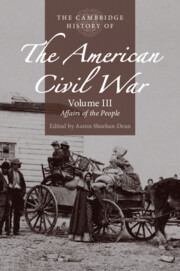Book contents
- The Cambridge History of the American Civil War
- The Cambridge History of the American Civil War
- The Cambridge History of the American Civil War
- Copyright page
- Contents
- Plates
- Figures
- Contributors to Volume III
- Note on the Text
- Part I Values
- Part II Social Experience
- Part III Outcomes
- 14 Making Peace
- 15 Reconstruction during the Civil War
- 16 Veterans and the Postwar World
- 17 The Civil War and the American State
- 18 The Civil War and American Law
- 19 The Civil War in Visual Art
- 20 The Civil War in American Thought
- 21 The Civil War in Literary Memory
- 22 The Civil War in Film
- 23 The Civil War in Public Memory
- Index
- Plate Section (PDF Only)
- References
20 - The Civil War in American Thought
from Part III - Outcomes
Published online by Cambridge University Press: 11 October 2019
- The Cambridge History of the American Civil War
- The Cambridge History of the American Civil War
- The Cambridge History of the American Civil War
- Copyright page
- Contents
- Plates
- Figures
- Contributors to Volume III
- Note on the Text
- Part I Values
- Part II Social Experience
- Part III Outcomes
- 14 Making Peace
- 15 Reconstruction during the Civil War
- 16 Veterans and the Postwar World
- 17 The Civil War and the American State
- 18 The Civil War and American Law
- 19 The Civil War in Visual Art
- 20 The Civil War in American Thought
- 21 The Civil War in Literary Memory
- 22 The Civil War in Film
- 23 The Civil War in Public Memory
- Index
- Plate Section (PDF Only)
- References
Summary
In the days that followed his first fight, having seen bodies ripped apart by bullets and shells, Virginian Cornelius Bell prayed every night for God to keep him from returning to the battlefield. “No never again do I wish to pass through what I did last Monday evening and night.” Wherever he turned, he saw men “suffering the agonies of death.” That night, when the musketry turned to desultory skirmishing, Bell felt great sympathy for the “dead & dying enemy,” “Each & every one of whom” he wrote to his wife, “was some ones darling son, brother or husband. And there they lay cold in death, their bodies stripped of the few old clothes they had on & every indignity that could be heaped upon them was.” Some of the wounded were still clinging to life, their naked bodies shaking in the final spasms of life as Bell watched in horror. When the Shenandoah Valley farmer turned Confederate soldier thought about the desecration of the dead, he was sickened by the hypocrisy of his comrades whom “I suppose in the estimation of some [think] this was all right.” Bell could just imagine his fellow soldiers saying the following words as if memorized in their youth. “The Yanks are a God forsaken people & we are his delight.
- Type
- Chapter
- Information
- The Cambridge History of the American Civil War , pp. 422 - 438Publisher: Cambridge University PressPrint publication year: 2019



